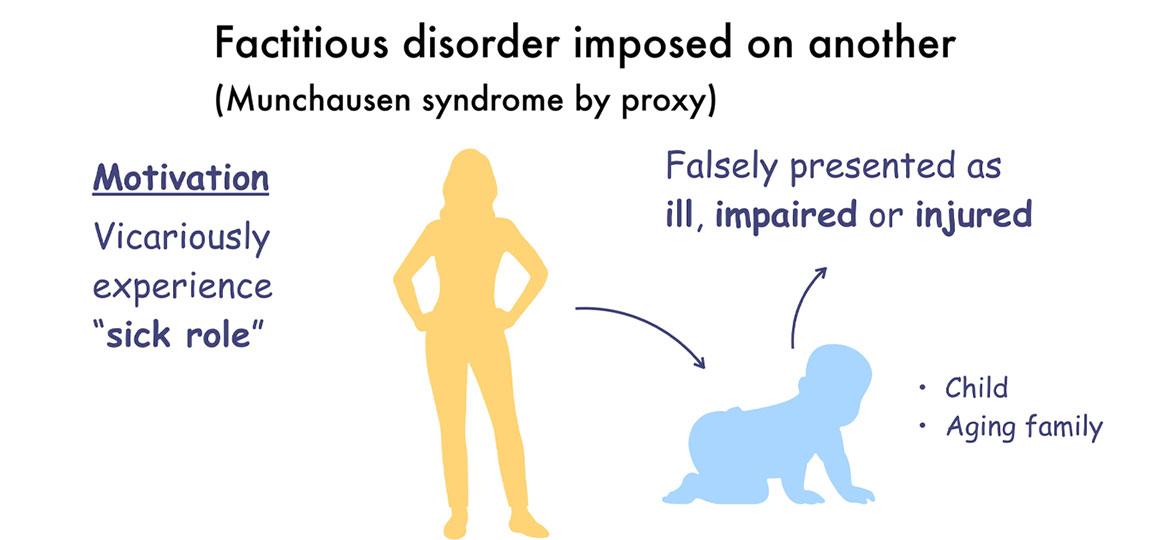Factitious Disorder by Proxy: Symptoms, Causes, Treatment
What the symptoms of factitious disorder by proxy?
Factitious disorder imposed on another (FDIA), formerly known as Munchausen syndrome by proxy, is a mental health condition in which a person acts as if an individual in their care has a physical or mental illness when the person is not actually sick. This condition is considered a form of abuse. Symptoms of FDIA can include:
- Falsification of symptoms: The caregiver may make up or exaggerate symptoms of illness in the person under their care. This can include reporting false information to healthcare providers or manipulating test results.
- Inducing symptoms: In some cases, the caregiver may actually induce symptoms of illness in the person under their care. This can involve administering medications, tampering with test results, or causing physical harm.
- Seeking unnecessary medical care: The caregiver may frequently seek medical care for the person under their care, often at multiple healthcare facilities. They may be knowledgeable about medical terminology and procedures.
- Reluctance to allow others to have contact with the person: The caregiver may be overly protective and reluctant to allow other caregivers or family members to have contact with the person under their care. They may provide conflicting or confusing information about the person’s condition.
- History of similar behavior: The caregiver may have a history of similar behavior with other individuals in their care or may have a history of factitious disorder imposed on themselves.
It’s important to note that individuals with FDIA often go to great lengths to maintain the deception and may be skilled at manipulating healthcare providers. Diagnosis and treatment of FDIA require a multidisciplinary approach involving mental health professionals, child protection services, and medical providers.
What the causes of factitious disorder by proxy?
The exact causes of factitious disorder imposed on another (FDIA), or factitious disorder by proxy, are not fully understood. However, several factors may contribute to the development of this condition:
- Psychological factors: Individuals with FDIA may have underlying psychological issues, such as a need for attention, a desire to assume the sick role, or a history of trauma or abuse. These factors may drive them to fabricate or induce illness in another person.
- Relationship issues: FDIA often occurs in the context of a caregiver-patient relationship, such as a parent caring for a child. Issues in the caregiver’s life, such as feelings of inadequacy, low self-esteem, or difficulties in relationships, may contribute to the development of FDIA.
- Past experiences: Some individuals with FDIA may have had past experiences with illness, either personally or in their family, that have influenced their behavior. They may have learned to associate illness with attention or other benefits.
- Need for control: Individuals with FDIA may have a strong need for control over their environment or relationships. Fabricating or inducing illness in another person may be a way for them to exert control.
- Personality factors: Certain personality traits, such as narcissism or a tendency toward manipulation, may be more common in individuals with FDIA.
It’s important to note that while these factors may contribute to the development of FDIA, the condition is complex and can vary widely among individuals. Treatment for FDIA typically involves psychotherapy to address underlying psychological issues and help the individual develop healthier coping mechanisms.
What is the treatment for factitious disorder by proxy?
The treatment for factitious disorder imposed on another (FDIA), or factitious disorder by proxy, typically involves a multidisciplinary approach due to the complexity of the condition. Treatment may include:
- Psychotherapy: Psychotherapy, such as cognitive behavioral therapy (CBT), is often recommended to help individuals with FDIA understand and change their behavior. Therapy can also help address underlying psychological issues that may contribute to the disorder.
- Family therapy: Family therapy may be beneficial in cases of FDIA, as it can help improve communication and relationships within the family. It can also help family members understand and cope with the disorder.
- Medical management: Medical providers may be involved in the treatment of FDIA to ensure the safety and well-being of the individual under the caregiver’s care. This may include monitoring the individual’s health and providing appropriate medical care.
- Child protective services: In cases where children are involved, child protective services may be involved to ensure the safety of the child and provide support to the family.
- Support groups: Support groups for individuals with factitious disorder and their families can provide additional support and guidance.
Treatment for FDIA can be challenging, as individuals with the disorder may be resistant to acknowledging the problem and seeking help. However, with appropriate treatment and support, individuals with FDIA can learn to manage their condition and improve their quality of life.




